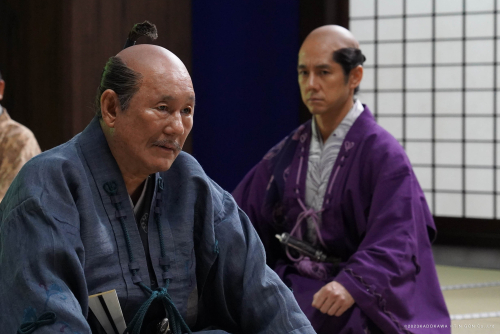
Festival de Cannes
MOVIE REVIEW
Kubi (2023)
The opening shot of the film is of crabs crawling out of a corpse’s spinal cavity, from the space where a head normally rests on a neck. And if you think that’s gory you ain’t seen nothing. Writer-director Takeshi Kitano has made a movie which required over 80 swordfight specialists to be thanked in the credits, and in which so many people are stabbed, shot, burned, decapitated or otherwise that the kill count is likely in the thousands, but somehow the mayhem is entirely watchable. It’s not played for laughs but it’s not done as torture porn, either. This is a balance that’s virtually impossible to achieve but Mr. Kitano has done it. “Kubi” is quite the sensation.
“Kubi” literally means “neck,” but is also a special basket in which a person can carry a severed head, which is handy to prove someone has been murdered and therefore collect the reward. The (broadly historically accurate) story takes place a brutal war for power in the feudal Japan of the late 16th century, after Lord Nobunaga (Ryo Kase) has won some fierce battles that have proved his status as a demon king. (His willingness to stab his senior employees in the mouth or rape his junior ones undoubtedly helped out there too.) One of his lords, Murashige (Kenichi Endo), attempts a rebellion, but loses, and must flee for his life while everyone in his castle is put to death in his place. Nobunaga tasks his other lords, including Hideyoshi (Mr. Kitano himself) and Mitsuhide (Hidetoshi Nishijima, who brings a calm rationality to the “The Death of Stalin”-esque insanity) to bring Murashige to him, promising whoever succeeds will become his successor instead of his idiot sons. So the scramble to find Murashige becomes a side war fought on several fronts, with various armies, spies, double-crossing priests, ex-ninja assassins, actual ninja assassins and the occasional Westerner thrown in for good measure.
It’s so frantic that characters must be introduced with their names in subtitle, but thanks to clever casting and astounding characterization it’s easy to keep everyone straight. Kenta Kiritani is introduced halfway through as a bodyguard so expert he can meet a sneak attack by calmly killing five ninjas in 10 seconds, leaving the sixth to run for his life as the watchers goggle in astonishment. A peasant named Mosuke (Shido Nakamura) who runs away to join Hideyoshi’s army returns home to find his family murdered and his house aflame; he falls to his knees and screams, not in grief but in relief that the family he was saddled with are gone and he’s free to follow his dream of becoming a samurai warrior. Presiding over it all is Mr. Kitano as a lord prone to practical jokes, but also so incapable of controlling his temper he has a tendency to demand his generals commit hara-kiri every time he’s annoyed. “Hey, that’s a little much,” one says in return.
Oh, and everyone is gay. Everyone. All these lords went to the same samurai practice as children and since then have been in various love triangles with each other. That means, on top of the war, there are dramatic temper tantrums, embraces, poisonings, assaults and fits of jealousy worthy of the finest reality TV. It’s so over the top that some other words probably need to be found to describe it, but it cannot stressed enough how easy this movie is to watch. The horror is done with a glee that somehow makes even the most gruesome death –
- a pregnant noblewoman being beheaded alongside her entire family
- someone stabbed with so many pikes they die standing, as there’s no angle for their body to collapse to the ground
- a Spanish priest in a building on fire being offered a church in exchange for performing one lousy stabbing
- Lord Ieyasu’s (Kaoru Kobaya) penchant for body doubles, who enjoy a life expectancy of a couple hours
- severed heads all over the place, in fact so many severed heads they are occasionally used as a hat
- the aforementioned hara-kiri
– all this slaughter becomes something to watch with fascination instead of turning away from. Takeshi Hamada‘s camera centers the drama without ever being overwhelmed by it, though the drama itself is of course overwhelming. Kazuko Kurosawa’s gorgeous costumes show the class distinctions within the army (and the small band of prostitutes which follow them everywhere) without making a fuss over how beautiful all those clothes are. And they really are beautiful – somehow a movie this blood-soaked and casual about death has an eye for splendor that is never lost amidst all the guts and gore.
At the Cannes Film Festival premiere, Mr. Kitano said that the next film he brings to the festival will be better. But honestly, he is being modest about his achievement here. Sometimes a person is just in the mood to see everyone die. When a work of art manages to go so far over the top that it comes around again, it’s astounding. And say what you will about “Kubi,” there isn’t a single dull second in it. Or a single dull blade.
Comments